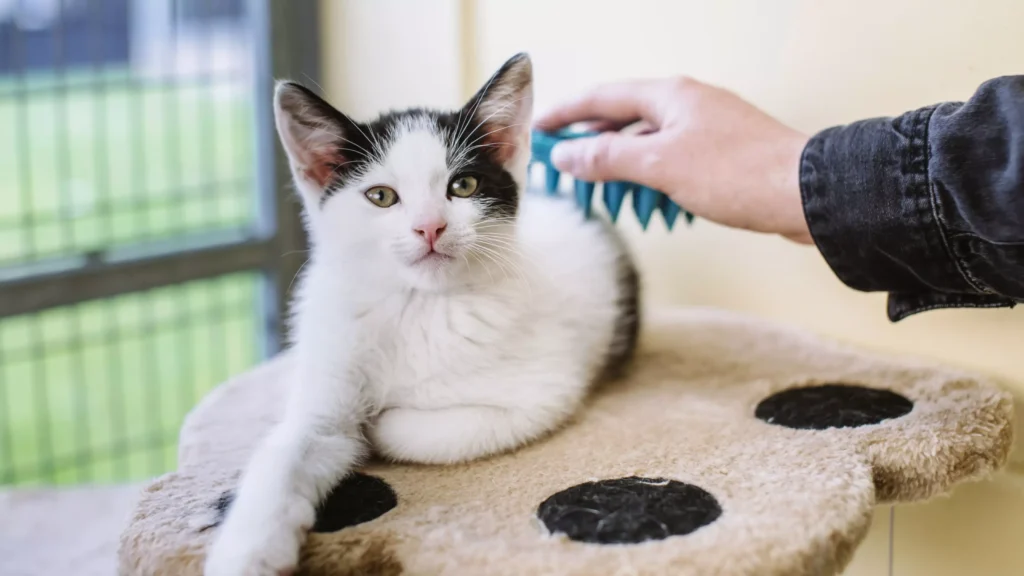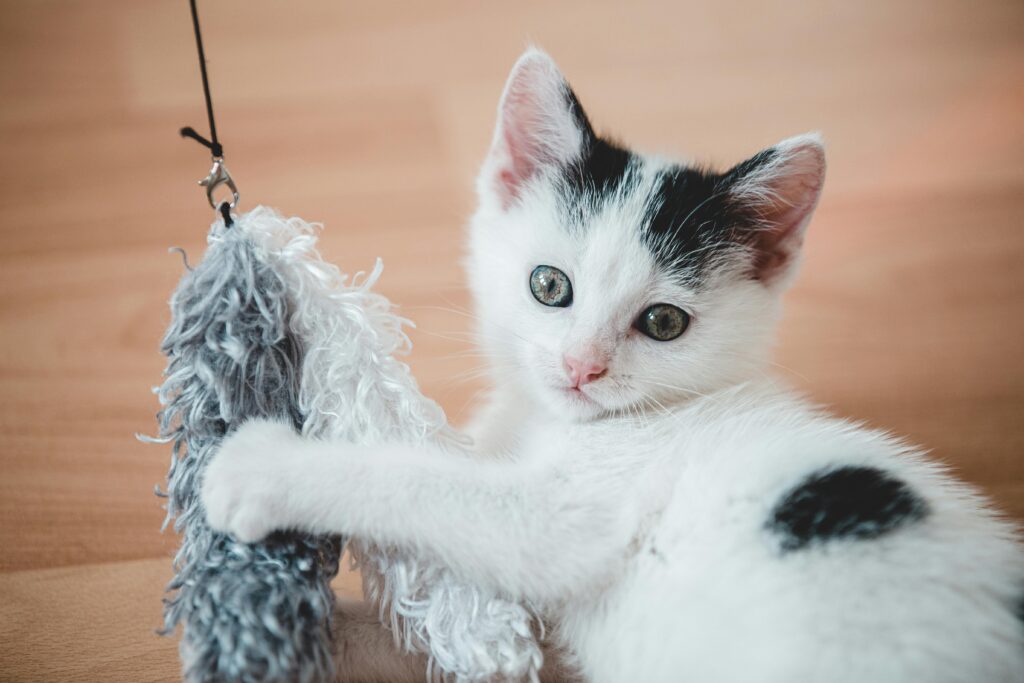Bringing a new kitten into your home is an exciting and joyful experience. From their tiny little paws to their playful nature, kittens have a way of stealing our hearts. But along with the joy comes the responsibility of caring for them properly. Providing the right kind of care from the beginning is crucial in ensuring that your kitten grows into a happy and healthy cat. This article will give you some essential kitten care tips, including kitten socialization and the importance of following a kitten vaccination schedule. By following these tips, you can ensure your kitten grows up happy and healthy. Let’s explore how to give your new friend the best start in life!
The Importance of Proper Nutrition for Kitten Care

One important aspect of kitten care that pet owners should prioritize is providing them with proper nutrition. Just like human babies, kittens have specific nutritional needs that must be met for them to grow into healthy adult cats.
Proper nutrition ensures that your kitten gets all the necessary nutrients, vitamins, and minerals they need for healthy growth and development. A balanced and well-rounded diet is essential to support their immune system, bone development, and overall health. It is important to choose high-quality kitten food specifically formulated for their needs. Consult your veterinarian for recommendations on the best kitten food brands and feeding guidelines to follow.
Grooming Tips for a Healthy and Happy Kitten

First and foremost, it is essential to establish a regular grooming routine from an early age. This will help your kitten get used to the process and make future grooming sessions easier. Start by gently brushing their coat regularly to prevent mats and tangles. Use a comb or brush specifically designed for kittens and be extra careful around sensitive areas like the belly and tail.
Next, pay attention to your kitten’s nails. Regular nail trims are necessary to prevent them from becoming too long and causing discomfort or injury. Invest in a pair of kitten-friendly nail clippers and ensure you trim just the tip of each nail, avoiding the quick. Start slow and reward your kitten with treats and praise to make the experience more positive.
Remember, regular grooming not only helps maintain their appearance, but it also allows you to bond with your kitten and detect any potential health issues early on. So, embrace the grooming process and enjoy the benefits of having a well-groomed and content kitten.
Signs of a Healthy Kitten
When it comes to kitten health, it can be overwhelming to determine whether your new furry friend is in good shape. However, there are a few signs you can look out for to ensure that your kitten is healthy and happy.
First and foremost, a healthy kitten should have a good appetite. They should show excitement and interest in their food, and have a healthy weight gain. Additionally, their water intake should be consistent and they should drink without any difficulty. A lack of appetite or excessive thirst could be signs of an underlying health issue.
Another important aspect of kitten health is their energy level and activity. A healthy kitten will be curious, playful, and full of energy. They should engage in activities such as running and climbing, and enjoy interacting with their toys and surroundings. A lack of energy or excessive lethargy can indicate a potential health problem.
Furthermore, a healthy kitten will have a clean and shiny coat. Their fur should be soft, free of mats or tangles, and their skin should be smooth and without any redness or irritation. Regular grooming and cleaning is important to maintain their coat’s health and appearance.
In conclusion, observing a kitten’s eating habits, energy level, and grooming can help you identify signs of a healthy kitten. If you notice any abnormalities or concerns, it is always best to consult with a veterinarian to ensure that your kitten receives the appropriate care and attention. Remember, a healthy kitten is a happy kitten!
Health and Safety Guidelines for Kitten Care
Ensuring the health and safety of your furry little friend should be a top priority. By following a few important guidelines, you can create a safe and nurturing environment for your kitten to grow and thrive.
First and foremost, it’s crucial to keep your kitten up to date on vaccinations and regular check-ups with a veterinarian. These precautionary measures can help prevent a wide range of illnesses and ensure that your kitten’s overall health is in check. In addition, it’s important to spay or neuter your kitten to prevent unwanted litters and reduce the risk of certain health issues later in life.
Another key aspect of kitten care is providing a safe physical environment. Keep your kitten indoors to protect them from potential dangers such as traffic, predators, and diseases. Ensure that all windows and balcony doors are securely screened to prevent accidental falls. Furthermore, remove any toxic plants, chemicals, or small objects that your playful kitten may ingest.
Lastly, make sure to provide your kitten with a balanced diet that meets their nutritional needs. Consult your veterinarian for recommendations on kitten-specific food and feeding schedules. Additionally, always have fresh water available for your kitten to stay hydrated.
By following these health and safety guidelines, you can give your kitten the best possible start in life and ensure their well-being. Remember, a little bit of effort and vigilance can go a long way in keeping your kitten safe and sound.
Bonding with Your Kitten through Playtime

When you bring a new kitten into your home, one of the most important aspects of kitten care is building a strong bond and connection with your furry friend. Bonding and playtime are crucial for creating a loving and trusting relationship that will last a lifetime.
To start building that bond, spend quality time with your kitten each day. Set aside specific periods for one-on-one interaction, whether it’s in the morning or evening. Use this time to engage in play activities, such as using interactive toys or feather wands, to stimulate your kitten’s mind and encourage physical activity. This not only helps them release energy but also builds trust as they see you as a source of fun and enjoyment.
Another way to foster a strong connection is through gentle touch and affection. Spend time petting your kitten, focusing on areas where they enjoy being touched, such as behind the ears or under the chin. This physical contact helps create positive associations and reinforces your bond. Remember to respect your kitten’s boundaries and allow them to approach you when they feel comfortable.
By prioritizing bonding and playtime in your kitten care routine, you are setting the stage for a loving and lasting relationship with your new kitten. Remember to be patient and understanding, as each kitten has their own personality and may take time to open up. With consistent effort and dedication, you’ll soon enjoy a deep and meaningful connection with your kitten.
Tips for Socializing Your Kitten
Proper socialization is key to raising a well-adjusted cat. Socialization helps kittens develop the necessary skills to interact with humans and other animals, reducing the likelihood of behavior problems down the line. If you’re wondering how to socialize your kitten effectively, here are a few tips to get you started.
The first step in socializing your kitten is exposing them to a variety of people and experiences early on. Inviting friends and family over to interact with your kitten helps them become comfortable with different individuals. It’s also important to introduce your kitten to different environments, such as other rooms in your house or the outdoors (with proper supervision). By exposing them to new situations, you are helping them build confidence and adaptability.
Another crucial aspect of socializing your kitten is introducing them to other animals. If you have other pets, be it dogs or cats, make supervised introductions to ensure a positive experience for everyone involved. Gradually increase the duration of these interactions, and always keep a close eye on their body language. If your kitten shows signs of fear or aggression, separate them and try again later.
By exposing them to new experiences, individuals, and animals, you are helping them develop into confident and well-adjusted cats. Remember to be patient and consistent in your efforts, as socialization is an ongoing process. With proper socialization, you’ll ensure that your kitten grows up to be a happy and sociable feline companion for years to come.
Understanding and Responding to Common Kitten Behaviors
Bringing a new kitten into your home is an exciting time filled with joy and wonder. But as adorable as they may be, kittens can also exhibit some challenging behaviors. Understanding these behaviors and knowing how to respond is essential for providing proper kitten care and guaranteeing a harmonious relationship with your furry friend.
One common behavior in kittens is excessive playfulness. You may find your kitten constantly pouncing, chasing, and biting. While this behavior can be adorable, it can also be quite rough on your hands and furniture. To address this, provide your kitten with plenty of appropriate playthings. Wand toys and interactive puzzle games are great options for redirecting their energy and keeping them mentally stimulated.
Another common trait is the curiosity of kittens. They love exploring every nook and cranny, which can sometimes land them in trouble. Ensure that your home is kitten-proofed by removing any potential hazards or toxic substances. Keep electrical cords out of reach, secure valuables, and block off any dangerous areas. This way, you can allow your kitten to explore without worrying about their safety.
Additionally, kittens often display a high level of energy, leading to a desire for constant attention and engagement. While it may be tempting to constantly play with them, it’s important to establish boundaries. Set aside dedicated playtime sessions throughout the day, but also encourage independent play. Providing puzzle toys or scratching posts will help keep them entertained when you’re unable to actively engage with them.
Understanding and responding to kitten behavior is an integral part of providing effective kitten care. By redirecting their playfulness, creating a safe environment, and balancing their need for attention, you can help your kitten develop into a well-behaved and happy companion. With patience, love, and proper guidance, you’ll form a strong bond that will last a lifetime.
Positive Reinforcement Training for Your Kitten
Training your kitten is an essential part of kitten care that can lead to a well-behaved and happy cat. Positive reinforcement techniques are an effective way to train your kitten without resorting to punishment or negative reinforcement. By using rewards and encouragement, you can teach your kitten appropriate behaviors and build a strong bond with them.
One of the key aspects of positive reinforcement training is to reward your kitten for good behaviors. This can be done by giving treats, praising with a gentle voice, or using playtime as a reward. For example, if your kitten uses their litter box, immediately praise them and give them a small treat. Similarly, if they scratch on their scratching post instead of the furniture, offer plenty of praise and a treat. This positive association will motivate your kitten to repeat the desired behavior.
Consistency is vital when training your kitten. Establish clear guidelines and stick to them. Use consistent verbal cues or hand signals to communicate with your kitten, such as saying “sit” when you want them to sit. Repetition is key in helping your kitten understand what is expected of them. Be patient and persistent in reinforcing positive behavior, and correct any undesirable behavior in a calm and gentle manner.
Remember, training should be fun and stress-free for both you and your kitten. Keep training sessions short and frequent, as kittens have shorter attention spans. Offer plenty of playtime and physical stimulation to keep your kitten engaged and excited about training. This positive experience will not only help with obedience but also strengthen your bond with your furry friend.
In conclusion, positive reinforcement techniques are effective in training your kitten for a well-behaved cat. With rewards, praise, and encouragement, you can teach your kitten appropriate behaviors and establish a strong bond. Consistency, patience, and a stress-free approach are key to successful training. By incorporating these techniques into your kitten care routine, you are setting the foundation for a happy and well-behaved cat.
Additional Resources for Kitten Care
When it comes to taking care of a new kitten, there is a lot to learn. Fortunately, there are many resources available to help you navigate the joys and challenges of kitten care. Whether you need advice on feeding, litter training, or behavioral issues, there are plenty of places to find the support and information you need.
One of the best places to start is your local veterinarian. They are a wealth of knowledge when it comes to all aspects of pet care, including kittens. Not only can they provide you with essential veterinary care for your beloved kitten, but they can also offer guidance on topics such as nutrition, vaccinations, and preventative care. They may even have brochures or handouts on kitten care that you can take home and refer to whenever you have a question.
Remember, caring for a kitten is a rewarding but sometimes challenging experience. By utilizing additional resources for support and information, you can ensure that you are providing the best care possible for your furry friend. From veterinary guidance to online communities and educational materials, there are plenty of places to turn to when you need a little extra help along the way.

